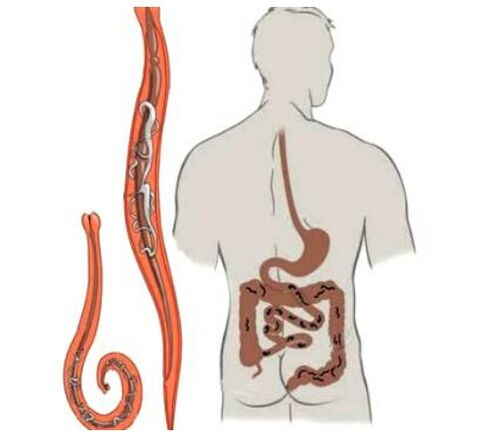The human body is an ideal environment for the habitat of pathogenic microorganisms that can influence almost any organ or system, which leads to a number of diseases and disorders. Such organisms are given a special place among parasites that live and eat by cells and other nutrients of the "owner" body. According to medical indicators, around 90% of the population of different age categories are carriers of parasites, the treatment and study of which is involved in the section of medicine -parasitology. The term "parasites" means that living organisms of different types that have the ability to settle down in the human body is introduced in tissues in internal organs, food cells, juices or digested food. Foreign organisms can enter part of our body and live in it for a long time or throughout the life of a person. Some types of parasites in the human body do not cause any special changes, but there are those who are able to negatively influence the drill hole of the "host" and cause the development of some serious illnesses. In such cases, we talk about parasitic diseases that require immediate treatment. In medicine, parasites are called pathogenic organisms that lead a parasitic lifestyle in the human body. This includes a variety of bacteria, viruses, mushrooms and worms, simple, unicellular, arthropods, protozoal invasions and other species.
What are parasitic diseases?

Parasitic diseases (invasions) are a large group of diseases caused by a variety of pathogenic organisms that multiply life and that multiply in one person. There are about 300 types of parasites that can influence the human body. Parasitic diseases can be caused by pathogenic bacteria and parasitic protozoa, arthropods, individual and other parasites or viruses. The list of parasites in the human body is quite large, but regardless of the type, almost all of them free toxins, destroy the cellular structures, damage the internal organs, into the lymph flow, the blood that poisoned the body and disrupt the work of internal organs and systems.
Basically, pathogenic organisms consume nutrients that a person receives together with food. Perhaps this behavior of "uninvited guests" explains that many people who conduct the right lifestyle, monitor their health and food do not achieve the desired result, since these "intestinal" take away everything and leave a person only a small particle of useful substances. These creatures are so clever that they are often disguised as other diseases, and a person can run around for years through the doctors, but cannot notice a positive result for treatment.
How do parasites fall into the human body?
Foreign organisms can penetrate the human body several times, but mostly the infection is done by:
- Water or soil infected with worms.
- Food products that have not passed the desired processing: poorly fried meat, fish, dirty vegetables, fruit, dairy products.
- Contact with domestic or homeless animals.
- Insect stitch.
- Non -compliance with personal hygiene rules.
- Close contact with the carrier of parasites.
Many parasites living in the human body have no nervous, cardiovascular or respiratory system, but their reproductive organs can throw hundreds of thousands of mature eggs into the environment. Eggs and larvae of parasites are very stable, they can be in the ground, water, food or personal objects for a long time. For example, Bandworm -Eier can withstand minus 15 degrees and maintain their vital activity for 9 months. Almost all parasites have protective mechanisms that cannot recognize and destroy the human body. That is why many parasitic diseases are difficult to diagnose. Pathogenic organisms can be both in the intestine and in lungs, blood, liver, joints, brain and even eyes. The location of the localization of pathogenic organisms depends on its kind and other characteristics, both one person and the parasites themselves.
Parasites that live in the body distinguish substances that help them live in one person for many years. You do not have a digestive system, but still parasites only use advantageous substances that get into the human body, which enables them to live for many years while one person slowly loses their health and does not suspect the real reason.
Special organisms to adapt to new conditions use your "devices": pointed hooks, plate stockings, hard hair, suction cups that constantly injure mucous membranes of organs. The parasites themselves can have a length of several millimeters to several meters. You can also separate different toxins that poison the body as a whole, and not only cause disorders in the work of internal organs, but also suppress immunity, destroy the advantageous bacteria of the stomach rectangle and overloaded the praise in waste.
Signs and symptoms of parasites in the body

Parasites in the body - symptoms of your presence may be missing or resemble clinical manifestations of other diseases. For example, larvae in the lungs causes symptoms of pneumonia, pinworms - an attack of appendicitis and parasites - the biles of the bile wing or an attack by pancreatitis.
In addition, parasitic diseases can be able to do frequent colds, sore throats, bronchitis and other diseases. You can assume the presence of parasites in the human body according to the following symptoms:
- Disorders in the work of the gastrointestinal tract: diarrhea, flatulence, frequent constipation, irritated intestinal syndrome
- Joint and muscle pain
- Allergic skin reactions
- Anemia: Many "roommates" feed on blood, which leads to the development of iron deficiency anemia
- Reduce or increase body weight
- Violations in the work of the psyche. Toxins that distinguish parasites
- Brooksism - tooth rattles in a dream
- Intestinal dysgosis
- Violations in the work of the immune system. Many worms and parasites reduce the production of immunoglobulin A, which leads to a decrease in immunity over time. One person is completely defenseless against viral and infectious diseases
- Inflammatory processes of the respiratory tract
- Oncological diseases. Long -term finding
In addition to the symptoms mentioned above, parasitic invasions often damage the liver, the kidneys and the cardiovascular system, which leads to a violation of their work and the development of many diseases that are difficult to treat. It is important to note that all the above signs of parasites in the human body are not precise confirmation of their presence. Only professional and high -quality diagnostics will help to determine the presence or absence of "uninvited guests".
How to recognize a parasitic disease
It is quite difficult to diagnose the presence of helminths, especially immediately after the infection. Until recently, the only way to identify "strangers" was to identify, duodenal sound and analysis of feces. The results of such studies made it possible to determine fragments, larvae or eggs from parasites. However, such methods did not always provide reliable results. Modern techniques are currently being used to identify parasites with which you can identify almost any parasite.
- Calais analysis (carried out at least three times)
- Immunoform analysis (Elisa)
- Elisa tests
- Serological research methods
- Ultrasound examination of internal organs (ultrasound)
- Computed tomography
- PCR diagnostics offers an analysis of parasites based on DNA analysis
The research results not only make it possible to determine the presence of parasites in the body, but also to evaluate the condition of the internal organs and to identify other diseases or disorders.
Treatment of parasitic diseases
The treatment of parasitic diseases depends on many factors: a certain type, its size, the amount, age of the patient, body weight and other characteristics. A large selection of pharmaceuticals against parasites is provided on the pharmaceutical market, but not all medication can overcome a certain parasite. It is important to note that almost all parasites violate the work of the internal organs. Therefore, the patient should be prescribed comprehensive treatment, which aims not only at the destruction of the invasion, but also to the restoration of the damaged inner body.
In addition to synthetic drugs, antibiotics against worms, anti -parasitic means that contain natural components are used in the treatment of parasites. Such funds have no contraindications and are well tolerated by the human body.
Only one doctor should treat parasitic diseases according to the results of research and the determination of the pathogenic organism. The course of treatment, doses and names of pharmaceuticals are prescribed individually for each patient. All anti -parasitic drugs have a large number of contraindications and side effects, so that you need medical advice before you use it.
What is important when treating parasites is the use of pharmaceuticals, which is the functionality of the stomach intestine tract, the liver, the kidneys, which help to stimulate immunity, to convey vitamin preparations to the body. No less than the main thing in the treatment of parasitic diseases is an appropriate nutrition. Patients have to rule out their diet with meat and dairy products because they are an ideal environment for the spread of parasites. It is also necessary to completely exclude the use of sugar and sweets. The diet should be balanced, high quality and useful for the body.
The forecast after the treatment of parasitic diseases is basically favorable, but in that case when large parasites of large sizes in the body or considerable damage to the internal organs are determined, it is difficult to predict the result after the treatment.
Prevention of parasitic diseases

You can protect yourself from the penetration of parasites, but only in the case if you observe simple rules. The prevention of parasites in a person's body is in:
- Compliance with personal hygiene rules
- Lack of contact with homeless animals
- Avoid children near pets
- Play with a child on the street to ensure that they do not choose different objects
- After playing in the sandpit, you should wash your hands
- Do not eat on the street during the walks, only after your hands have been washed
- Regular cleaning of the house
- Use only washed and treated vegetables, fruit
- Just eat well fried meat
- Drink only cooked water
- If an animal needs the whole family in the house every 6 months to prevent parasitic diseases.
Compliance with simple preventive rules makes it possible to protect yourself against infections with parasites, which protects yourself and your family from possible diseases in the work of internal organs that so often manifest against the background of parasitic diseases.
















































